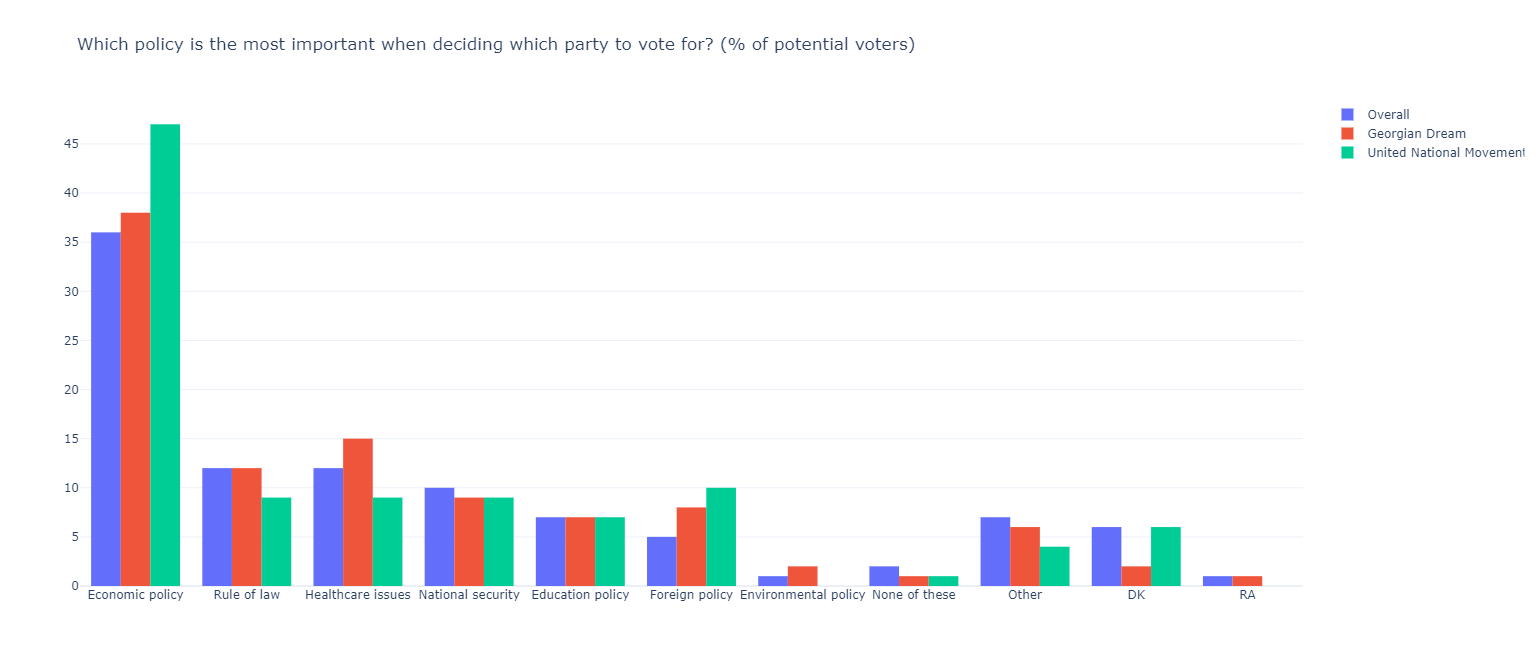
While personality in politics matters greatly for the Georgian public, data from this year shows that for Georgian Dream and United National Movement voters policy is still important.
A recent CRRC Georgia policy brief argued that what was really dividing Georgians politically was personalities rather than policies. Data from the August 2020 CRRC and NDI survey provides further evidence for this idea.
However, the data also shows a difference between Georgian Dream (GD) and United National Movement (UNM) voters in terms of policy preferences and that economic policy is the most important issue for a plurality of voters.
UNM supporters were slightly more likely to report that economic policy was most important compared to Georgian Dream supporters. Still, for a plurality of supporters of both parties, the data indicate that economic policy is the most important issue.

When it comes to professional training versus formal education, 26% of the public prefers a party prioritizing formal education, and 50% a party prioritizing professional training. A regression analysis shows no significant differences between supporters of the UNM and GD.
Differences are present between those with different levels of education, however. People with vocational education are 10 percentage points more likely, and those with higher education eight percentage points more likely, to support investing in professional education than people with secondary education or a lower level of education. Women are six percentage points less likely than men to support vocational education as opposed to formal education.
The survey asked whether people would prefer a party that proposed lower taxes or higher pensions, with 27% preferring higher pensions and 56% preferring lower taxes. With regard to preferences for a party that would support higher pensions or lower taxes, UNM supporters are 23 percentage points more likely to prefer a candidate that supports higher pensions rather than lower taxes. The reverse is true of GD supporters.
Aside from party support, a number of other characteristics are associated with support for higher pensions as opposed to lower taxes. People who are currently employed are nine percentage points more likely to support lower taxes than those who are not. People over the age of 56 are 26 percentage points more likely to support higher pensions than people between the ages of 18-35. People with higher education are 11 percentage points more likely than people with secondary education alone to support lower taxes. People in rural areas are seven percentage points more likely to support higher pensions.
While the data does show a difference with attitudes on higher pensions versus lower taxes, personalities remain primary for supporters of both major parties. A slight majority of the public (55%) report that personalities matter to them more than policies. In contrast, 20% say that election promises and political platform matter more. A further 15% agree with neither idea and the remainder have indicated that they do not know which of the two they find more important.
There are no significant differences between supporters of the UNM and GD on this question. The only difference identified in a regression analysis on the issue is that employed people are six percentage points less likely to view personalities as more important compared with those that are not presently employed.
The above data re-affirms past analyses that have shown that personality dominates policy in Georgian politics. Yet, the data does show at least one meaningful difference on economic policy between supporters of the two main parties when they are considering who to vote for.
Note: The data analysis presented in this article are based on regression models controlling for respondent age group (18-35, 36-55, 56+), employment situation (working or not), party support (Georgian Dream, United National Movement, Other party, no party/don’t know/refuse to answer), education level (secondary or less, vocational education, or tertiary education), sex (female or male), and settlement type (capital, other urban, or rural). The data used in this article are available here.
This article was written by Dustin Gilbreath, Deputy Research Director at CRRC Georgia. The views presented in the article do not represent the views of CRRC Georgia, the National Democratic Institute, or any related entity.








